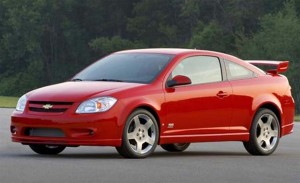
A 2007 Chevrolet Cobalt, one of the recalled GM vehicles, could be one of the vehicles responsible for as many as 74 deaths, according to new research.
According to new research, the faulty ignition switch that caused General Motors to recall 2.6 million small cars since January may be responsible for as many as 74 deaths, not the 13 reported by the automaker and federal agencies.
Reuters reported it conducted a search the Fatality Analysis Reporting System (FARS), a national database of crash information submitted by local law-enforcement agencies, for collisions similar to those involving GM’s recalled vehicles: single-car frontal collisions where no front air bags deployed and the driver or front-seat passenger was killed.
The news agency found two things: between 2003 and 2012, 45 people died in Chevy Cobalts and 29 in Saturn Ions – totaling 74 – in crashes under the aforementioned circumstances. It also found people are six times more likely to die in those vehicles than in comparable vehicles, such as the Ford Focus, Honda Civic and Toyota Corolla.
Because of the way data is reported to FARS, Reuters or others cannot drill down exactly how many people have died as a result of the defect. The official number is 13, but several organizations have proffered possible totals, including 303 announced by the Friedman Research Corp., which conducted research on the database, on behalf of some of the victims families.
Clarence Ditlow, the head of the Center for Auto Safety and a long-time GM critic, said this week that his review of complaints filed with National Highway Traffic Safety Administration indicates that the defect has contributed to at least 50 deaths and he expects the total to rise as investigators uncover more cases where air bags failed to deploy in GM cars because the engine had switched off.
The Insurance Institute for Highway Safety (IIHS), a non-profit safety research group connected with the U.S. insurance industry, reviewed the Reuters analysis.
David Zuby, executive vice president and chief research officer, told Reuters: “Your crash rates suggest that Cobalt and Ion are less crashworthy than the other models for which you’ve computed similar statistics,” and are similar to those in a 2011 IIHS analysis.
(Trucks and SUVs lead banner sales in May. For more, Click Here.)
NHTSA Acting Administrator David Friedman took it a step further telling Reuters: “The final death toll associated with this safety defect is not known to NHTSA, but we believe it’s likely that more than 13 lives were lost.”
(Click Here for details about what was hot and not in May.)
However, GM remains steadfast in it’s belief that total is 13. The automaker said it arrived at the figure of 13 fatalities by assessing the detailed information in the claims data available to us. The criteria we used to make the determination was based on engineering expertise in both air bag deployment and electrical systems.
Airbags are supplemental restraints designed to deploy only in certain crashes. There are a number of factors that may contribute to an airbag deployment, such as severity of the cash, the angle of impact, occupant position and duration of the crash.
(To see the teaser for Nissan’s new pickup truck, Click Here.)
“GM continues to monitor all claims we are made aware of in the recall population,” the company said in a statement. NHTSA fined GM $35 million – the maximum allowed – and forced the automaker to agree to be supervised by the agency for three years.
GM agreed to give the government unprecedented access as it continues its investigation, noting that federal investigators will be in GM facilities and GM employees will come to Washington D.C. on a regular basis.
